ASAP’s Energy Conservation Tips
To protect and preserve the environment is of vital importance, so is cutting electricity bills on a monthly basis. Households can achieve both goals when using their appliances if they follow our energy saving advice.
Refrigerator & Freezer Energy Saving Tips 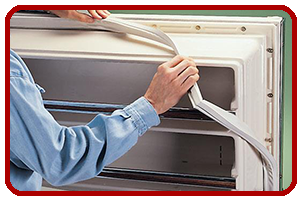
- To prevent the compressor from overworking:
- Do not store unwrapped food and uncovered liquids. The compressor’s regime is over forced by the released moisture.
- Do not open the door frequently.
- Shop smart and keep the refrigerator fully loaded to trap the cold air inside.
- Hints for correct maintenance:
- Ensure the airtightness of the door. If seals are cracked or leaking, cool air will escape.
- Do not allow dust to accumulate on the condenser coils.
- Certain refrigerator models require regular manual defrosting.
- Choose the right location:
- Place the refrigerator away from all heat sources.
- Place the refrigerator away from direct sunlight.
- Temperature settings:
- For refrigerators – between 35F and 38F
- For built-in freezers and stand-alone freezers – between 0F and 4F
Oven, Stove & Range Energy Saving Tips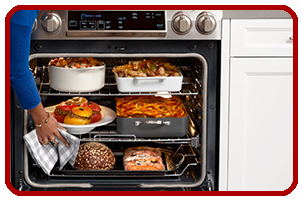
- Food in ceramic or glass dishes requires less heat to cook. Cooking takes the same time even if you lower the temperature by 25 degrees.
- A number of meals can be baked or cooked simultaneously to utilize the available space and the generated heat.
- It comes cheap to use a microwave or a slow-cook crock pot for small to medium size portions. These appliances feature lower energy consumption than a normal oven.
- Make your cooking twice faster by defrosting your food long time in advance.
- Food is prepared faster if you cut it into small pieces.
- Do not open the oven door to check if your food is ready. The temperature drops and the oven consumes more electricity to regain the normal heat. Better use an oven timer.
Dishwasher Energy Saving Tips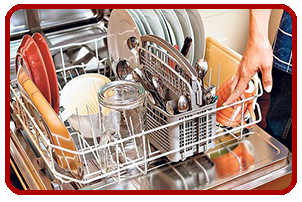
- Night hours and off-peak hours are the perfect time to switch on the dishwasher. If you run your dishwasher during the cooler hours of the day, you will save both energy and the environment.
- Do not pre-rinse if not necessary. State-of-the-art dishwashers are designed to entirely remove the dirt from the cooking utensils. You only scrape off the big food remnants and liquids, and then your appliance takes care of the rest. Typically, pre-rinsing should be used only in case of stubborn dried or burnt pieces of food on your dishes.
- Whether half loaded or fully loaded, your dishwasher uses the same volume of water. Therefore, fill your dishwasher to the maximum.
- If your dishwasher has a built-in energy saving cycle, be sure to utilize this function whenever possible.
- Allow your cooking utensils to dry naturally. When the final rinsing is over, open the dishwasher door to let the dishes air-dry. If you need to use the drying regime of your dishwasher, go in favor of air-dry mode instead of heated-dry mode.
Dryer Energy Saving Tips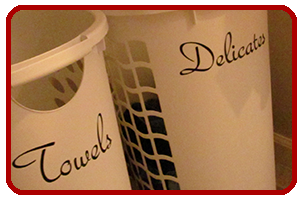
- In order to optimize the efficiency of your appliance every time you load it, sort and group your laundry according to its drying time. Lightweight synthetic garments require shorter drying time than thick bath towels.
- A sequence of loads is preferable to a single load in order to use the heat that is retained in the dryer.
- Separate extra-heavy items, like towels, into separate loads.
- The dryer filter needs regular de-fluffing. If it is clogged up and dirty, the normal operation of the dryer will be impaired and its effectiveness lost.
- Solar energy is free of charge! Do not miss the chance to take advantage of the sun. Hang and dry your clothes in the open air outside.
Washing Machine Energy Saving Tips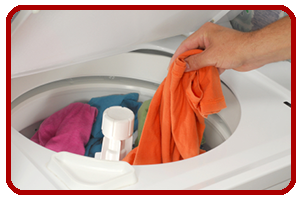
- Present-day washing machines are designed to perform well with cold water. So are modern laundry detergents and fabrics. If, however, cold water cannot do the job, use warm water wash before switching to hot water.
- Take full advantage of your washer’s capacity. Twice more energy is saved for a single full-load than two half-loads.
- As far as your washer works better at lower temperatures, choose to do your washing in the cooler hours of the day.
- High-speed spin cycle is preferable if you want to reduce the drying time.
when buying a New Appliance
- Size is of the essence. Take correct measurements of the place in your home where you intend to put the appliance. If you can fully open its door, you will ensure the right space for ventilation.
- Use the model number as a reference to review the appliance online.
- Bear in mind that a smaller appliance consumes less energy. Compare microwaves to ovens, stand-alone freezers to refrigerator, etc.
- Buy energy-saving models. Though more expensive initially, in the long run these types of appliances prove to be energy efficient and enable environment protection. Refer to EnergyGuide to compare the energy ratings of different models.
If you need more information on energy conservation when using your appliance, call us at (615) 410-2480 or e-mail us.




